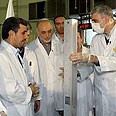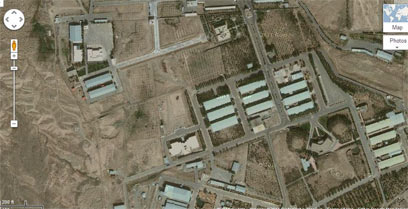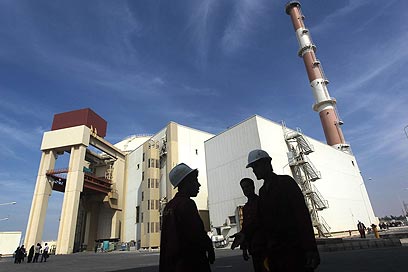
Iran: 2nd reactor in Bushehr by early 2014
Atomic Energy Organization head says Islamic Republic to build 1,000-megawatt nuclear plant next year; claims Tehran has 'no reason' to suspend its enrichment of uranium to 20%. Ahmadinejad to parliament: Stand with me against 'evil ones'
The head of Iran's Atomic Energy Organization said the country is to build a new nuclear power plant, alongside its sole existing one in the southern city of Bushehr, by early 2014.
"Iran will build a 1,000-megawatt nuclear power plant in Bushehr next year," state television quoted Fereydoon Abbasi Davani as saying on Sunday. He was referring to the Iranian calendar year running from March 2013 to March 2014.
During a speech at a university in Tehran, Abbasi Davani said Iran does not have experience in building reactors and will therefore have to "finish planning the construction and use external elements
The current Bushehr nuclear plant was started by German engineers in the 1970s, before Iran's Islamic revolution, and was completed by Russia, which continues to help keeping it running and provides fuel for it.
In addition, Iran has a research reactor operating in Tehran that is used to make medical isotopes for patients with cancer and other illnesses.
Abbasi Davani also said Tehran has "no reason" to suspend its enrichment of uranium to 20%, one of the key demands of world powers engaging Iran in talks, the head of its Atomic Energy Organization said.
"We have no reason to cede on 20%, because we produce only as much of the 20% fuel as we need. No more, no less," Fereydoon Abbasi Davani was quoted as saying late Saturday by the ISNA and Mehr news agencies.
Related articles:
- ISIS: Iran has enough uranium for 5 bombs
- Iran threatens American east coast
- Iran to Hezbollah: Don't strike Israel
The issue of Iran's enrichment of uranium to 20%, and its stockpile of that uranium, were at the center of talks on Wednesday and Thursday in Baghdad between Iran and six world powers (Britain, China, France, Russia and the United States plus Germany).
Those talks neared collapse when the powers, known as the P5+1, demanded Iran give up that activity and its stockpile in exchange for some inducements such as aircraft parts for its dilapidated commercial fleet and technical assistance in nuclear energy.
Iran, which is suffering under Western sanctions, said the inducements were far too little and countered with a demand that the P5+1 declare that it has a right to enrich uranium.
With that impasse, which Abbasi Davani termed "predictable," the talks teetered on failure and were saved only by last-minute wrangling that agreed to give negotiations another shot in Moscow on June 18-19.
Abbasi Davani was quoted as saying that Iran had now joined the small group of countries "that can produce fuel for others."
He added: "It is better that others engage us about providing (them) with fuel, not that they (the West) demand we shut down our fuel production."
According to the latest report by the International Atomic Energy Agency, Tehran has produced 145.6 kilograms of 20% enriched uranium, of which nearly a third has been converted into fuel for its research reactor.
Iran has also produced more than six tons of uranium enriched to 3.5%, part of which was processed further to make the 20% stock.
Uranium enriched to 90% or above is used for military ends, to make nuclear warheads. Twenty% uranium is considered just a few steps short of that level.
The IAEA has voiced suspicions that Iran might be working towards nuclear weapons research. It says its inspectors have not been given sufficient access to verify or invalidate that suspicion, although it expressed optimism that an agreement should be signed soon with Tehran permitting that.
Iran, for its part, insists its nuclear program is exclusively peaceful. It has railed against Western sanctions hitting its vital oil and financial sectors that aim to force it to curb its activities as unfair and illegal, although it claims they are ineffective.
Those sanctions are set to tighten further on July 1, when an EU embargo on Iranian oil comes fully into effect. By then, US sanctions targeting Iran's central bank will also be fully implemented.
A diplomat on the P5+1 negotiating side told AFP that the Iranians were already obviously hurting under the Western sanctions, "but are too proud to say anything explicit."
The diplomat added that Iran's threat to walk away from the talks in Baghdad appeared to have been an attempt to "panic concessions out of us" but it did not work, and the P5+1 closed ranks.
With the talks moving to Moscow next month, the diplomat said, the onus would be on Russia -- which has supported Iran within the P5+1 -- to move them forward.
"The Russians will feel the need to deliver something positive and will have to sit on Iran," the diplomat said.
Abbasi Davani also said that the UN nuclear watchdog has not yet given good enough reasons to visit an Iranian site where it suspects there may have been experiments for developing nuclear weapons.
A report from the International Atomic Energy Agency (IAEA) last week said satellite images showed "extensive activities" at the Parchin complex, at the center of Western suspicions that Iran is developing atom bombs. Tehran denies any such plan.
Iranian officials have refused access to Parchin, southeast of Tehran, saying it is a military site.
"The reasons and document have still not been presented by the agency to convince us to give permission for this visit," the head of the Atomic Energy Organization of Iran, Fereydoun Abbasi-Davani was quoted as saying by Fars news agency.
Meanwhile, Iran’s President Mahmoud Ahmadinejad urged the country’s newly-elected parliament to stand with him against “evil ones” who he says have encircled the nation.
The president’s address to the opening session of the parliament on Sunday was seen as an appeal to conservative opponents who crushed Ahmadinejad’s allies in voting that ended earlier this month.
“Today, evils have been mobilized from all directions to put the Iranian nation under pressure. Removing and resisting the pressures, and cooperation, are the main priority today,” Ahmadinejad told lawmakers without elaboration. State TV broadcast the speech live.
AFP, Reuters, AP contributed to the report
- Follow Ynetnews on Facebook and Twitter
- Receive Ynetnews updates directly to your desktop












